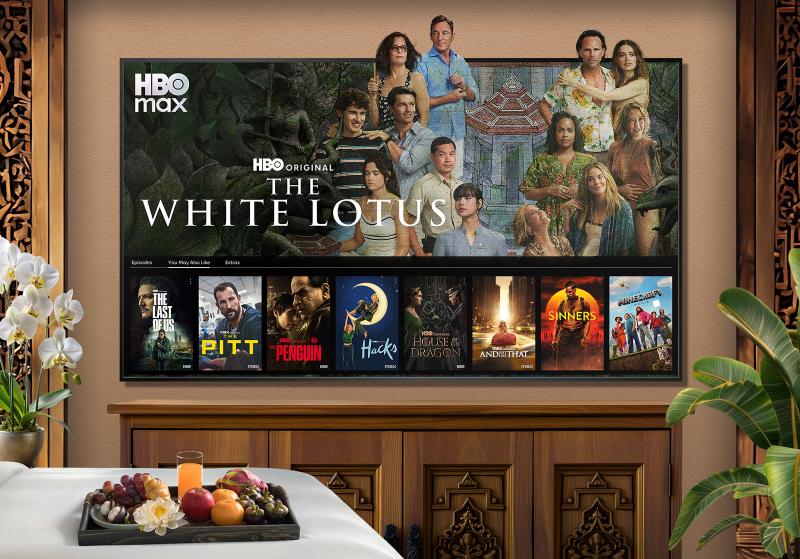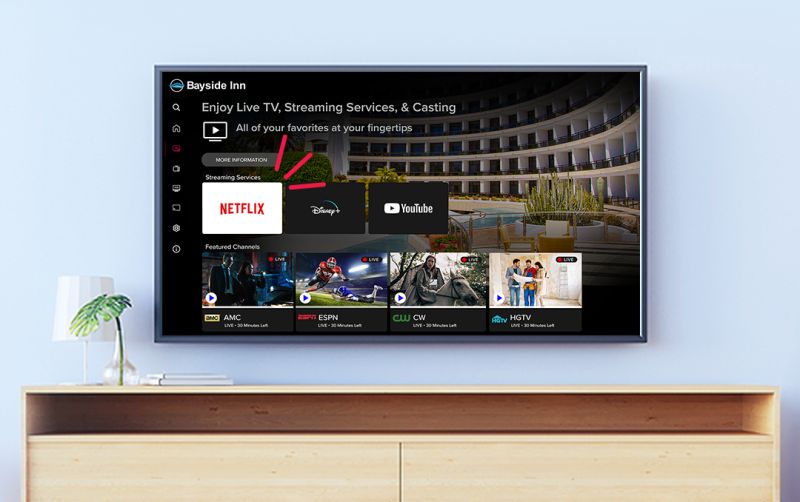In-room guest entertainment has come a long way in a short time. Televisions have been transformed into portals to a world where streaming, casting and gaming, and present virtually unlimited entertainment options, and guests are driving a growing wish list of features that they consider essential to a modern in-room entertainment experience.
Lorraine Ou, director of partner management at HBO, said that one of the most significant in-room entertainment trends in the hospitality industry is the adoption of streaming services. This trend began in guests’ homes, as consumers have been increasing their entertainment consumption of streaming services.
“There’s a shift in consumer expectations where travelers are now prioritizing flexibility, convenience and experiences. They want instant access to all the entertainment options they've become accustomed to at home or on the go,” Ou said. “If people are watching HBO Max and Netflix at home, they're going to expect to have that capability in their hotel rooms as well.”
However, according to Ou, guests would prefer free on-demand content from streaming services and an easy-to-navigate interface to be a part of their hotel stay. Hotels that offer these services will be at the forefront of in-room entertainment trends to give them a competitive edge. With the growing demand for streaming, HBO Max distinguishes itself by allowing guests to access content without requiring personal account credentials.

“Our subscription model is billed directly to the property, enabling hotels to provide complimentary access to their guests,” said Ou. “Guests can immediately use the app to enjoy the full range of content—from the iconic Game of Thrones and Sopranos to the widely acclaimed The White Lotus and The Last of Us—without needing to enter logins, passwords or scan QR codes. It’s a hassle-free solution designed to enhance the guest experience.”
“In terms of the technology needed, hotel properties are at different stages of hardware,” Ou said. “So, some hotels will need to upgrade their TVs and internet services in order to offer streaming apps. However, there is no additional cost for hoteliers to switch from the HBO linear service to the HBO Max streaming service.”
Ou also noted that “HBO has maintained a trusted legacy in the hospitality industry for decades, consistently delivering a premium in-room experience that offers brand prestige with the familiarity travelers expect.”
“Guests have long associated HBO with enhancing their hotel stay experience,” she said. Today, guests expect streaming, so we are pleased to offer an additional service to linear TV in the form of HBO Max to carry that legacy forward and provide hoteliers with a reliable solution that meets guest needs while reinforcing familiar, quality entertainment.”
This Time it's Personal
A major trend in hospitality—particularly the luxury segment of the market—is personalization. David Goldstone, Enseo’s president of Hospitality, said guests want to feel welcome and be recognized, and using their in-room television screen has become an increasingly popular way for hoteliers to do that.
Guests arriving at their rooms can be greeted with a personalized message on their TV screens and their favorite music playing through their TV speakers. They can also receive customized messages tailored to the event that brought them to the hotel.
“Personalization is incredible,” Goldstone said. “If there’s a conference at the hotel, conference information can be presented on its own dedicated channel. If there's a wedding party, messages and photographs from the wedding party can be delivered directly to the appropriate rooms.”
Guests also are accustomed to traveling with their own devices, so they will want easy access to their own content in their rooms.
“We’re seeing hospitality televisions coming out with embedded services such as Google Cast and Apple Airplay built in,” Goldstone said. “That’s an indication of how big of a trend casting and guest-sourced media has become, and it will continue to grow.”
Another trend that is coming fast is advertising. Goldstone told Hotel Management that guests will be seeing an increasing number of targeted ads and commercials as the hotels learn their customers’ interests.
“Let’s assume I check in at a hotel where I’m an elite member, and the hotel knows I’m a golfer,” Goldstone said. “They will be able to target ads direct to my TV about the latest Titleist driver or Ping irons or golf courses in the area of the hotel. This type of targeted advertising is going to be more and more prevalent and it’s going to help hotels change their guest room entertainment from a cost center into a profit center.”
Not surprisingly, Goldstone recommends the best way to take advantage of all the potential that the future of in-room entertainment holds is by working with an integrator who understands the business and who can install, service and support hotel clients.
“That's the key today,” he said. “Our business is about enabling customer service and support while providing a software platform to further hotel owners’ and brands’ requirements. The actual hardware platform technology is moving more into the hands of the TV manufacturers. You're also going to see a lot of technology moving into the cloud, especially in luxury and upscale properties.”
Goldstone concluded by noting there artificial intelligence (AI) is another potential game-changer for in-room entertainment tech.
“AI is affecting guest-facing customizations and content that we’re already starting to see today,” he said. “For the backend technologies, there are multiple initiatives to enable functionality to make the systems more reliable using proactive analysis and automations.”
In Search of the Perfect Experience
In a recent independent study, DIRECTV HOSPITALITY asked consumers 21 years of age and older who spend at least five nights a year in hotels to prioritize the most important features they would choose if they could craft their perfect in-room entertainment experience.
Not surprisingly, fast, reliable Wi-Fi was at the top of the list, followed by the ability to use their own streaming accounts and watch live national and premium networks and live local stations.
“Consumers are no longer satisfied with the bare minimum when it comes to in-room entertainment options,” said Kimberly Twiggs, associate vice president of market development at DIRECTV HOSPITALITY. “Their appetite for consuming entertainment in various ways and on their own terms drives their hotel choices and are key components of a rewarding guest experience. Offering an in-room entertainment experience that’s seamless, intuitive and aligned with evolving guest expectations isn’t a trend—it’s table stakes.”
Twiggs noted that there are ways for hoteliers to bring personalization to their own unique brands and properties. For example, DIRECTV HOSPITALITY gives hoteliers the option to enable their own customized guest experience with the Advanced Entertainment Platform Partner Program.
“Through this program, DIRECTV provides programming content and a cloud technology platform to the customer, giving the brand or hotelier control of layering their unique guestroom entertainment experience into our product,” she said. “This is a great way for brands to differentiate themselves and to make full use of guest entertainment technology.”
In an era with increased competition for travel dollars where travelers have a multitude of choices, it’s important that hoteliers offer a robust and varied in-room guest entertainment offering. “DIRECTV HOSPITALITY’s Advanced Entertainment Platform helps to meet those traveler demands and drive repeat guest stays,” Twiggs said.
From a tech standpoint, Twiggs told Hotel Management that providing strong Wi-Fi is a must. Connectivity is at the foundation of meeting guest needs—whether that’s for entertainment or other purposes. App-based and on-demand content relies on strong broadband, so if Wi-Fi doesn’t operate seamlessly to allow guests to access content easily, it could significantly impact the guest experience—and the hotel’s revenue.
On the entertainment side, DIRECTV HOSPITALITY offers equipment subsidies on the Advanced Entertainment Platform and its other entertainment solutions to help offset the costs associated with bringing premium in-room entertainment to guests.
“My advice is to lean into in-room entertainment,” Twiggs said. “Our latest research can help hotel property owners and managers make strategic decisions about their in-room entertainment and help provide their guests with the right combination of entertainment options to make their stays more enjoyable.”
Twiggs concluded by noting that empowering guests is key.
Hoteliers should choose the technology they implement strategically so guests feel more empowered during their stay, versus having technology just for the sake of having it,” she said. “Hotels should focus on the top priorities of their guests, like premium entertainment choices, and embrace the technology that best meets the needs of their customer profiles and property operations.”
Five Trends to be Future-Ready
As guest expectations evolve and operating expenses rise, hotel owners and operators are looking for ways to differentiate their properties and grow revenue beyond bookings.
Technology is one way to do that, but investing in the right tech means staying ahead of industry trends. Josh Wade, director of product, DISH Business, offers five hospitality tech trends he’s seeing, and suggests one amenity you already have in every guestroom—televisions—can help you meet them.
- Personalization matters. A recent Medallia study found that more than 60 percent of consumers will spend more with brands that offer personalized experiences.
- Guests want choice. In-room entertainment is no exception. With streaming services offering endless content at home, guests expect the same during their stay.
- Flexibility is a winning tech feature. Hoteliers often struggle with integration. Scalable, modular solutions that work with your existing infrastructure make upgrades easier and more cost-effective.
- AI and automation aren’t just for software. From personalizing content based on guest loyalty profiles to curating restaurant recommendations, AI has the potential to deliver hyper-personalized entertainment experiences.
- Smarter operations are essential. With ongoing budget and staffing challenges, hotels need tech that saves space and energy, while reducing time spent troubleshooting.

“DISH Business helps hoteliers implement future-ready entertainment technology that improves the guest experience, streamlines operations and works with your property today—while preparing you for what’s next,” Wade said.
In-room Stats
- In a study of 1,905 hotel guests, overall self-reported satisfaction ranged from 6.1 (out of 10) in hotels where guests felt personalization was low to 9.2 in hotels where guests felt personalization was high.
—Medallia Market Research - 72 percent of guests are interested in accessing their personal streaming accounts through their guestroom TV.
—Hotel Internet Services, 2022 Guestroom Casting Survey
This article was originally published in the September edition of Hotel Management magazine. Subscribe here.

